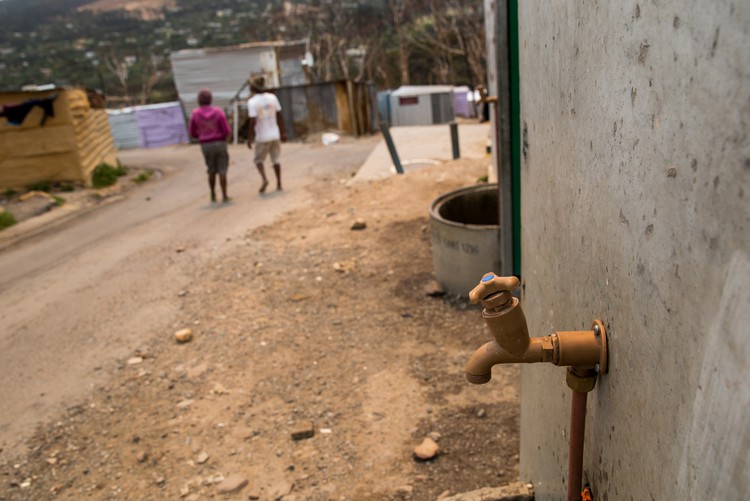Why is government taking so long to finalise water standards?
Much needed legislation has not moved since 2017. It’s up to us, the public, to put pressure on our elected leaders to finish the job.
Archive photo of a tap inside the Imizamo Yethu informal settlement in Hout Bay. Ashraf Hendricks
All South Africans are guaranteed the right to access adequate water under Section 27(1) of the Constitution and it is the responsibility of the state to gradually realise this right within its available resources. However, for many families living in informal settlements and rural areas, their right to water and sanitation has yet to be realised.
The national Department of Water and Sanitation (DWS) indicated in September 2017 that it had developed a draft set of Norms and Standards for Domestic Water and Sanitation services, but these were never published for comments or formally approved by government for implementation.
The norms and standards are an important piece of legislation that regulates the provision of water and other basic services. It provides a set of standardised criteria that cannot be deviated from. It addresses fundamental aspects such as the minimum amount of water that people need access to on a daily basis, and the maximum number of people that can use a communal toilet. This legislation directly affects the quality of life of millions of South Africans.
And yet there has been little to no clear indication when the final revised draft norms and standards will be published for public comment. Answering a parliamentary question, Minister of Water and Sanitation Senzo Mchunu said the draft would be released by 15 October 2022.
Without the norms and standards, municipalities and other government structures have been left to develop their own, as long as they are aligned to the 2001 broad regulations relating to compulsory national standards and measures to conserve water.
This means that over the course of 20 odd years, the legislation has not been revised nor received the proper attention needed to accommodate the changes that have occurred in rural and urban settings across the country. Policy has therefore focused on addressing water services and backlogs in suburban areas, overlooking the challenges prevalent in informal settlements and rural contexts.
One of the major issues with current policy is that it perpetuates the lack of accountability municipalities have enjoyed in providing inadequate basic services to lower income communities. As a result, according to research conducted by Afesis-corplan, many informal settlements and rural areas are grossly underserved because of inadequate national norms and standards being in place.
Many metros and municipalities (such as the City of Cape Town, George and Hessequa) use guidelines provided by the Emergency Housing Programme of one tap for every 25 households and one toilet seat for every five families. Other metros, such as Buffalo City, aim for one tap per 50 households and one toilet seat per ten households.
According to a submission by the Social Justice Coalition (SJC) in the Western Cape hearings on this matter, while government statistics might indicate a high level of access to water and sanitation, the norms and standards being used to ascertain access levels are incorrect. “Many local and provincial governments have no real understanding of how many people live in settlements, particularly in informal settlements. Without having this information, it is impossible to provide services to all,” the SJC noted.
Public participation is a fundamental feature in a democratic process that allows for the issues, concerns and suggestions of experts, organisations, and communities to make their voices heard. The department will be seeking input from the public on the expected new draft norms and standards prior to them being formalised.
It is therefore important that the public is vigilant and aware of the valuable opportunity for those who are interested in water and sanitation issues, in urban and rural contexts, to come together and put forward recommendations for what they believe should be included in the final norms and standards that are approved for the country.
We need to ensure that the content of any revised set of norms and standards ultimately, in a progressive manner, leads to a situation where everyone living in informal settlements, rural communities and other inadequately served areas have access to sufficient water and sanitation.
Views expressed are not necessarily those of GroundUp
Support independent journalism
Donate using Payfast

Don't miss out on the latest news
We respect your privacy, and promise we won't spam you.
Next: African women demand voice at climate change summits
Previous: Army of fake companies used to defraud the Lottery
© 2022 GroundUp. This article is licensed under a Creative Commons Attribution-NoDerivatives 4.0 International License.
You may republish this article, so long as you credit the authors and GroundUp, and do not change the text. Please include a link back to the original article.
We put an invisible pixel in the article so that we can count traffic to republishers. All analytics tools are solely on our servers. We do not give our logs to any third party. Logs are deleted after two weeks. We do not use any IP address identifying information except to count regional traffic. We are solely interested in counting hits, not tracking users. If you republish, please do not delete the invisible pixel.

